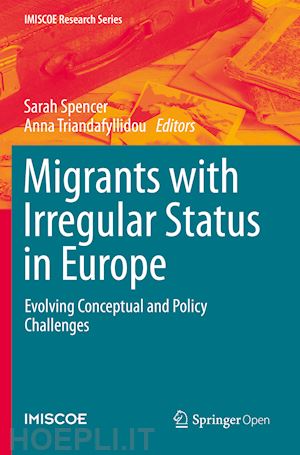
Questo prodotto usufruisce delle SPEDIZIONI GRATIS
selezionando l'opzione Corriere Veloce in fase di ordine.
Pagabile anche con Carta della cultura giovani e del merito, 18App Bonus Cultura e Carta del Docente
This open access book explores the conceptual challenges posed by the presence of migrants with irregular immigration status in Europe and the evolving policy responses at European, national and municipal level. It addresses the conceptual and policy issues raised, post-entry, by this particular section of the migrant population. Drawing on evidence from different parts of Europe, the book takes the reader through philosophical and ethical dilemmas, legal and sociological analysis to questions of public policy and governance before addressing the concrete ways in which those questions are posed in current policy agendas from the international to the local level. As such this book is a valuable read to researchers, practitioners and policy makers as well as to students working on irregular migration in Europe in a comparative and/or country based perspective.
Prelims.- Chapter 1: Introduction: Migrants with Irregular Status in Europe: A Multi-faceted and Dynamic Reality: Anna Triandafyllidou and Sarah Spencer.- Chapter 2: Understanding Irregularity: Anna Triandafyllidou and Laura Bartolini.- Chapter 3: Contradictions in the Moral Economy of Migrant Irregularity: Sébastien Chauvin and Blanca Garcés-Mascareñas.- Chapter 4: The Human Rights of Migrants with Irregular Status: Giving Substance to Aspirations of Universalism: Colm O’Cinneide.- Chapter 5: European Union and National Responses to Migrants with Irregular Status: Is the Fortress Slowly Crumbling?: Nicola Delvino.- Chapter 6: The Transnational Mobilization of ‘Irregular Migrants’: Milena Chimienti and John Solomos.- Chapter 7: Crackdown or Symbolism? An Analysis of Post-2015 Policy Responses Towards Rejected Asylum Seekers in Austria: Ilker Ataç and Theresa Schütze.- Chapter 8: Irregular Migration and Irregular Work: A Chicken and Egg Dilemma : Anna Triandafyllidou and Laura Bartolini.- Chapter 9: The Economy of Reception: A View from Southern Europe: Laura Bartolini, Regina Mantanika, and Anna Triandafyllidou.- Chapter 10: Cities Breaking the Mould? Municipal Inclusion of Irregular Migrants in Europe: Sarah Spencer.- Chapter 11: Evolving Conceptual and Policy Challenges Sarah Spencer and Anna Triandafyllidou.
Sarah Spencer is Director of the Global Exchange on Migration and Diversity and a Senior Fellow at COMPAS at the University of Oxford. Her particular interests are in irregular migrants, integration, human rights and equality issues, and in the policy making process. She was an Open Society Fellow (2012-2014), exploring issues relating to irregular migrants in Europe and is a Visiting Professor at the Human Rights Centre, University of Essex. Sarah was awarded her doctorate at Erasmus University Rotterdam, has an MPhil from University College London and took her first degree at the University of Nottingham.
Anna Triandafyllidou is the Canada Excellence Research Chair in Migration and Integration, at Ryerson University, Toronto, Canada. She was previously Robert Schuman Chair at the Global Governance Programme of the European University Institute (Robert Schuman Centre for Advanced Studies, 2012-2019) where she directed the Cultural Pluralism Research Area. She is the Editor-in-Chief of the Journal of Immigrant and Refugee Studies, Chair of the IMISCOE Editorial Committee, and member of the IMISCOE Board of Directors. She has been Visiting Professor at the College of Europe in Bruges between 2002 and 2018. Her recent books include: Migration and Globalisation Handbook (E. Elgar, ed. 2018); The Problem of Religious Diversity: European Challenges, Asian Approaches (with T. Modood, ed. Edinburgh University Press, 2018); Multicultural Governance in a Mobile World (ed. Edinburgh University Press, 2018); Global Governance from Regional Perspectives (Oxford University Press, ed., 2017).











Il sito utilizza cookie ed altri strumenti di tracciamento che raccolgono informazioni dal dispositivo dell’utente. Oltre ai cookie tecnici ed analitici aggregati, strettamente necessari per il funzionamento di questo sito web, previo consenso dell’utente possono essere installati cookie di profilazione e marketing e cookie dei social media. Cliccando su “Accetto tutti i cookie” saranno attivate tutte le categorie di cookie. Per accettare solo deterninate categorie di cookie, cliccare invece su “Impostazioni cookie”. Chiudendo il banner o continuando a navigare saranno installati solo cookie tecnici. Per maggiori dettagli, consultare la Cookie Policy.